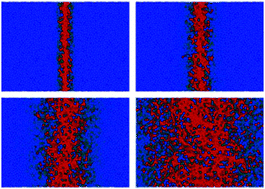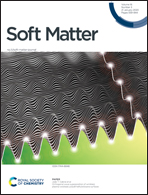Energy transport in glasses
Abstract
The temperature dependence of the thermal conductivity is linked to the nature of the energy transport at a frequency ω, which is quantified by thermal diffusivity d(ω). Here we study d(ω) for a poorly annealed glass and a highly stable glass prepared using the swap Monte Carlo algorithm. To calculate d(ω), we excite wave packets and find that the energy moves diffusively for high frequencies up to a maximum frequency, beyond which the energy stays localized. At intermediate frequencies, we find a linear increase of the square of the width of the wave packet with time, which allows for a robust calculation of d(ω), but the wave packet is no longer well described by a Gaussian as for high frequencies. In this intermediate regime, there is a transition from a nearly frequency independent thermal diffusivity at high frequencies to d(ω) ∼ ω−4 at low frequencies. For low frequencies the sound waves are responsible for energy transport and the energy moves ballistically. The low frequency behavior can be predicted using sound attenuation coefficients.



 Please wait while we load your content...
Please wait while we load your content...